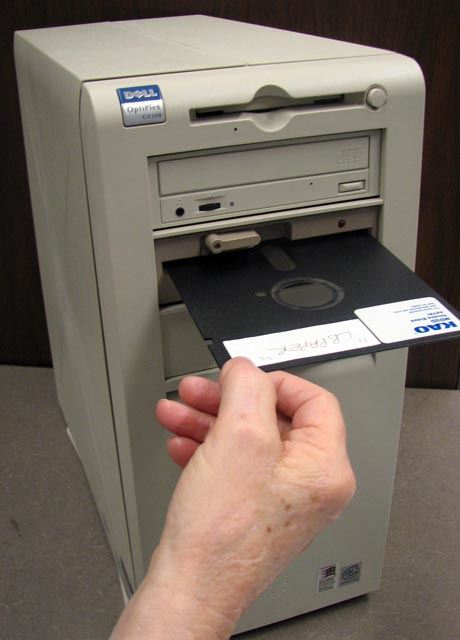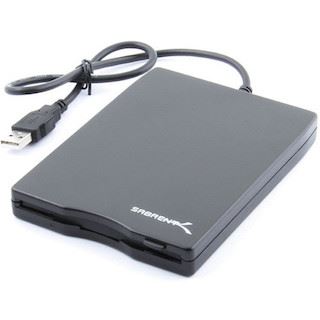Do you or someone you know have lots of files saved on floppy disks? A lady contacted me recently and asked how she could read her old floppy disks that she had saved from many years ago. It seems her present computer does not have a floppy disk drive in it. I suggested she do something NOW to save the disks. Before long, floppy disks will be about as useful as buggy whips.
Actually, there are THREE separate problems:
 The first problem is that floppy disks were never designed for long-term storage for years and years. The manufacturers usually stated ten to twenty years' life expectancy for floppies if they were stored in ideal conditions. A typical residence isn't ideal.
The first problem is that floppy disks were never designed for long-term storage for years and years. The manufacturers usually stated ten to twenty years' life expectancy for floppies if they were stored in ideal conditions. A typical residence isn't ideal.
In addition, floppy disks have always been highly sensitive to dust, condensation and temperature extremes. As with any magnetic storage, it is also vulnerable to magnetic fields. If the disk isn't stored in optimum conditions, the data will disappear because of these vulnerabilities. In many cases, data will disappear from floppies in much less than ten years.
The second problem is the one my correspondent mentioned: she no longer owns a floppy disk drive. In fact, most manufacturers stopped including floppy disk drives on new computers years ago. Luckily, you can still purchase external, “plug-in” floppy disk drives today although they are becoming rare.
If possible, see if someone you know owns an older computer that includes both a floppy disk drive and some method of copying information from floppy disks to some other media. Possibilities are to transfer across a network, transfer on the Internet, copy to a flash drive, or maybe to "burn" to a CD-ROM.
 If you cannot find an older computer, you can purchase an external USB floppy drive that plugs into the USB port of most any modern Windows or Macintosh computer. The drives typically cost $10 to perhaps $30. You can see a selection of USB 3 1/2-inch floppy disk drives for sale today at https://duckduckgo.com/?q=floppy+disk+drive.
If you cannot find an older computer, you can purchase an external USB floppy drive that plugs into the USB port of most any modern Windows or Macintosh computer. The drives typically cost $10 to perhaps $30. You can see a selection of USB 3 1/2-inch floppy disk drives for sale today at https://duckduckgo.com/?q=floppy+disk+drive.
If you have an even older 5-1/4-inch floppy, your search will be more difficult. Very few of the older disk drives were ever manufactured with a USB connection. However, if you are willing to open the computer and bolt in an internal floppy drive, you might still be able to find a few on eBay.
The third, and possibly the biggest, problem of all is the information stored on the disk. Even if the data has not disappeared, and even if you can copy the files to more modern media, can you find a program today that will read the files created by a program ten or twenty years ago? For instance, if you have files created by Roots 3 (a popular genealogy program of the 1980s), you will have difficulty finding any program today that will read information stored in that old format. To my knowledge, Roots 3 files can only be read by Roots 3 or later versions of the same program. Unfortunately, no program today can read Roots 3 files. The same is true for data saved in old versions of Personal Ancestral File, Family Tree Maker, or genealogy programs that have since disappeared from the marketplace, such as The Family Edge or Generations Grande Suite.
My advice:
1. Copy the files NOW! Whatever is stored on a floppy disk may disappear at any time. Save it while you can. Copy the files to modern media.
2. Attempt to open the files with a modern word processor or genealogy program or even a simple ASCII file viewer, such as Windows Notepad. If you are lucky, you may be able to read the information.
3. If you cannot read the files, post messages on online forums asking for assistance from anyone who still has an old computer with the old software installed. For instance, if you find someone who still has Roots3 installed on a computer someplace (and if they also have the optional Roots 3 program that creates GEDCOM files), they could import your data and then export it in GEDCOM format. The information then can be read by any modern genealogy program.
Whatever you do, don't get trapped in the obsolescence problems again. Copy your data often to whatever new media has recently become available.